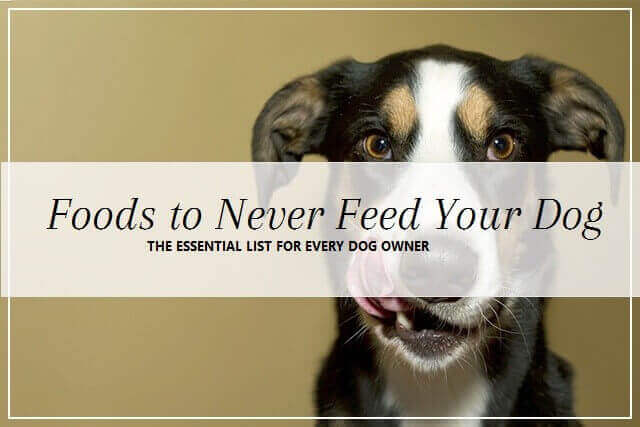If you feed your dog table food or if your dog is inclined to raid bins or pick up food while out walking it is important to understand which foods can be very dangerous if eaten.
Below is a list of foods you should never to feed your dog. If your dog does ingest any of these you should seek immediate veterinary advice.
Alcohol: Alcohol not only causes lack of coordination, intoxication, and acid build up in the dogs stomach, but it also can affect a dogs breathing, and cause the dog to go into a coma or die.
Apple seeds contain a natural chemical called amygdalin that releases cyanide when digested. This is harmful when ingested in high levels, so to be safe always core and seed an apple before feeding it to your dog.
Avocado fruit contains persin which causes stomach upset, diarrhoea, vomiting, and in some cases fluid accumulation around the heart. Ingestion of the avocado pit can lead to an obstruction in the digestive system which is a serious situation and requires urgent veterinary care.
Bread dough can be hazardous if ingested by a dog. Just as yeast rises in bread, when raw dough is swallowed the stomach provides an ideal environment for the yeast to multiply and expand. Expansion of the stomach may cause breathing difficulties, and decrease blood flow to the stomach wall. The alcohol produced by the yeast can also affect the dog as explained above. Other symptoms include lack of coordination, vomiting or attempting to, abdominal distention or seizures.
Cooked bones from poultry, fish and meat sources can easily splinter and cause laceration or obstruction of the digestive system.
Chocolate contains caffeine and theobromine which causes toxicosis in dogs. The darker the chocolate the more dangerous it is. Depending on the type of chocolate ingested symptoms range from vomiting, abdominal discomfort, increased thirst, and restlessness to muscle tremors, high temperature, irregular heart rhythm, seizures and death. If your dog eats chocolate and is showing more than mild restlessness see your veterinarian immediately. The same applies to coffee.
Grapes and raisins contain a toxin that can cause severe liver damage and kidney failure. Symptoms that occur with 12 hours of grape or raisin toxicosis include vomiting, lethargy, diarrhoea, refusal to eat and increased urination. Death due to kidney failure may occur with 3-4 days.
Macadamia nuts contain a toxin that can inhibit locomotor action. Affected dogs develop weakness in the rear legs, panting, pain, have tremors and may develop a fever. Macadamia nut toxicosis is unlikely to be fatal in dogs but it is very uncomfortable so your dog would benefit from veterinary care.
Onions and garlic and all close members such as shallots etc. contain compounds that can damage a dog’s red blood cells if ingested in sufficient quantities. Exposure to concentrated forms of garlic or onion such as soup mixes, garlic powder or dehydrated onions put dogs at more risk of toxicosis. Symptoms appear within 3-5 days and may include weakness, a reluctance to move, and urine may be orange or dark red in colour. These dogs should be seen by a veterinarian immediately.
Xylitol is a sweeter used in sugar-free products. When ingested by dogs is can lead to a rapid and severe drop in blood sugar levels, leading to disorientation and seizures within 30 minutes or may be delayed for several hours. Some dogs who ingested a large amount of xylitol develop liver failure which can be fatal.
Other foods to avoid include:
- Milk and Dairy products – dogs are lactose intolerant so cannot properly digest dairy foods which can lead to diarrhoea, colitis and excessive gas.
- Sugar – can lead to obesity, dental problems and possibly diabetes.
- Salt – if eaten in large quantities may lead to electrolyte imbalances.
- Fat Trimmings – can cause pancreatitis.
- Rhubarb Leaves – contain oxalates which affect the digestive, urinary and nervous system.
- Raw Salmon – contains a parasite that is often infected with a bacteria that is fatal to dogs if not treated properly. Cooking the salmon kills the parasite.
- Peaches and Plum pits can cause intestinal obstruction and enteritis.
- Cat Food – too high in protein and fats.
- Mouldy Food – a dog can have mould allergies so some moulds can cause serious problems if ingested.

